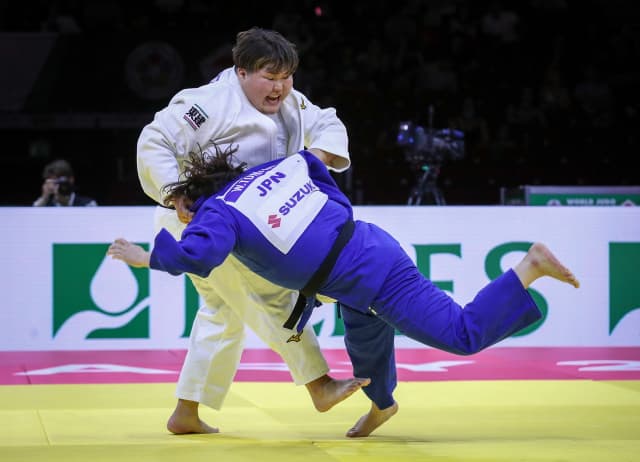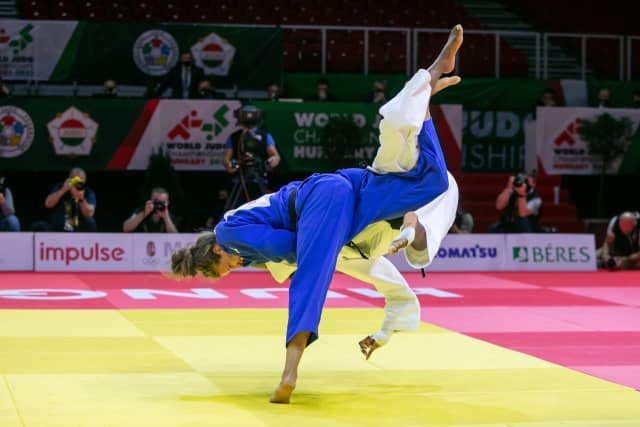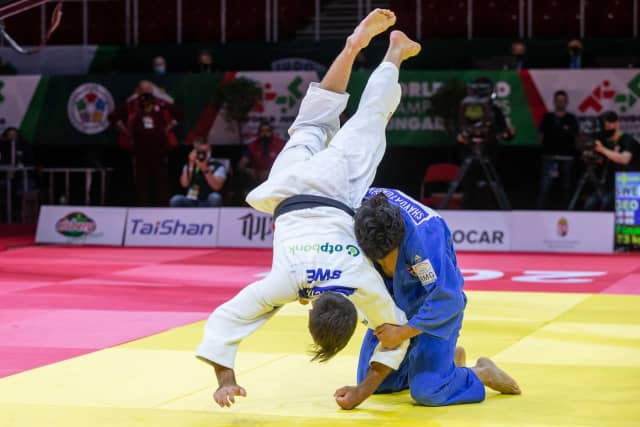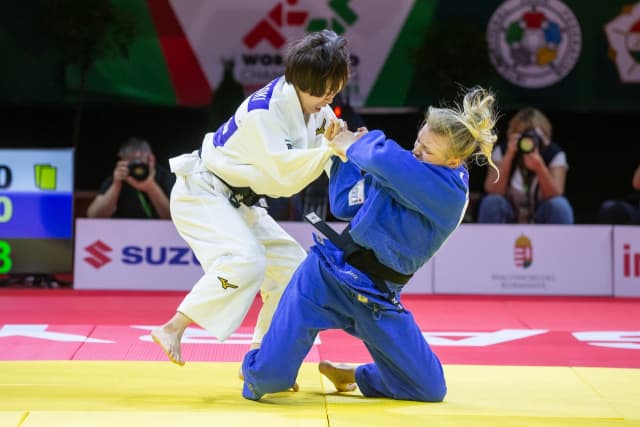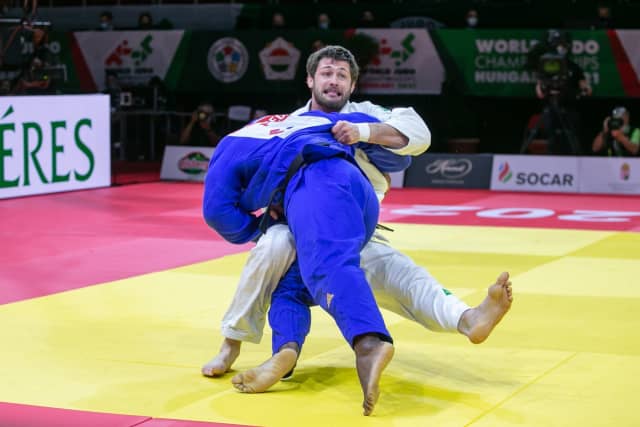Japan held a round trip World Championships, starring in the first final of the event with two Japanese judoka at -48kg and another two on the last day at +78kg. Japan finished in first position on the medal table with 11 medals, including five gold, which for many is not news, but in reality it is because it confirms the consistency of a country used to looking at the world from above.
However, the balance of the first world power contains chiaroscuro because they have missed gold medals that, logically, they should have won, according to most forecasts. The most notorious slip-ups occurred in the –60kg and –73 kg categories. Nagayama Ryuju is world number one in the lightest category and has not been off the podium since 2017. In Budapest he crashed in the third round. Not so loud, but still surprising was the defeat of his compatriot Hashimoto Soichi, also a leader in his category, also a world champion and also a loser in Hungary. At least he left with the bronze.
On the bright side, the world witnessed the return of Asahina Sarah, world champion for the third time at just 24 years old and a model of exemplary nature. Her departure from the mat in the +78kg final, carrying her adversary, Tomita Wakaba, defeated and injured, on her shoulders, explains the personality of an endearing woman.
Finally, Kageura Kokoro regained the heavyweight title for Japan to fatten the medal table and show that his career is not limited to having been the first to defeat Teddy Riner, after ten years of French rule.
Another disappointment, and this one is huge, was the performance of the French team. For the first time since 1973, the men returned to France in white. No medal, no final. For four years France has balanced its balance sheets thanks to the formidable women's team. Three current world champions and leaders of their categories landed in Budapest, in this order: Clarisse Agbegnenou (-63kg), Marie-Eve Gahié (-70kg) and Madeleine Malonga (-78kg). The first won her fifth world title, which did not surprise anyone. The problem is that, after winning so much, the exceptional becomes normal. Gahié lost in the first round, marking a year to forget in which she lost her red back patch and her chances of participating in the Olympics. The third in contention, Madeleine Malonga, ended up with a bittersweet taste in her mouth. She lost the final and therefore the title, against Anna Maria Wagner (GER), in what was perhaps an appetiser of a duel that has a high probability of being reproduced in the coming years. For her it was a disappointment, the sour part. However, there is also a sweet side because Malonga had not competed since January, despite which, she qualified for the final after defeating all her opponents clearly.
This time the French women failed to cover the disastrous balance of the men because the women's own performance was below their immense potential. France finished fifth in the medal table, which should make the federation leaders reflect.
Nature does not like emptiness and the failure of some always generates the success of others. In this case, two countries seized the opportunity to get in the lead car; two countries with different problems.
Georgia is a world power in judo, but it is thanks to the men's team. Until recently, Georgia suffered from the absence of competitive women who could aspire to win medals. The federation has corrected their aim and is beginning to show promising results. In addition, that allows the country to participate in the mixed team competitions.
At the moment the achievements depend almost exclusively on the men's team, and this is a team with enormous firepower. Half of those who will participate in the games came to Budapest and many promises accompanied them. As Georgia never does things by halves, Lasha Shavduashishvili (-73kg) won gold and became the best Georgian in history because he has already won the three most important competitions (European Championships, World Championships and Olympic Games ). There were more medals, one silver and two bronze, but the most striking and unexpected was that of Varlam Liparteliani (-100kg), eternal number one, eternal contender for gold, simply eternal because everyone admires the athlete and adores the man. Georgia was second in the medal table.
We said that there were two countries with different trajectories and obstacles. If Georgia needs to strengthen its women's team, Spain's problem is more prosaic, even vulgar, but decisive. What happens to Spain is that its resources are very limited compared to other countries. Instead, what it has are two good teams. In Budapest, Spain demonstrated it with four medals, with two women and two men. Nikoloz Sherazadishvili won a second world title (-90kg) and for the first time in judo history a third place in the medal table.
Since we are talking about historical records, it is Croatia's turn. For the first time in its history, it has a world title, thanks to Barbara Matic (-70kg), who beat Ono Yoko of Japan in the final, in the most stressful and spectacular contest, with her opponent trying to strangle her and Matic holding on to her tachi-waza waza-ari for the remaining 40 seconds. There are no victories without sacrifices, the saying goes.
The intrahistory of Canada is known worldwide. Christa Deguchi and Jessica Kimklait (-57kg) were in Budapest to battle for world gold and a plane ticket to Tokyo. The leader of the ranking and world champion against the aspirant. Deguchi lost in the semifinals to Tamaoki Momo (JPN), who was in turn defeated by Kimklait in the final. It was a title for Canada and an Olympic destination for Kimklait. It remains to be seen how Deguchi will overcome the failure of the world championship and the disappointment of not going to Japan.
Everyone was waiting impatiently for the -81kg category. With the exceptions of Sagi Muki (ISR) and Vedat Albayrak (TUR), all the favourites were there. The final opposed the two most fit judoka of the moment, world number one, Matthias Casse (BEL) and the new prodigy of the Georgian school, Tato Grigalashvili. Casse had lost the 2019 World Championship final against Muki. Grigalashvili was the favourite of the forecasts. Casse won with the authority of a weight leader, against overbooked candidates for success.
There were also two butterfly effects and, furthermore, in the key of a record. Aleksandar Kukolj (SRB) upgraded six months ago, which is like saying yesterday. Not much was expected from his time in Budapest because the adaptation period was very short. However, it was enough for him! He won silver at –100kg, avoiding the gold at the hands of Fonseca (POR), who climbed the ranks of the world’s elite by winning a second gold in a row; a feat not achieved by many. It was Kukolj’s medal though, like the philosophical fluttering of a butterfly’s wings, qualified in the last second for the Olympic games, removed the classification and left three athletes out of the Olympic event.
The same happened at –90kg with Rémi Feuillet. In addition to planting the Mauritius flag in the quarterfinals, something unprecedented, the judoka obtained his Olympic pass, to the detriment of four other athletes, thanks to the points obtained in Budapest.
27 countries touched medals. That's a lot of diversity, a more balanced level between countries, which means fewer differences, more epic stories, more surprises and more work to always try to stay one step ahead. There were many fluttering butterflies and a lot of emptiness immediately filled.
And, one more thing: nobody talked about Covid, just judo.

